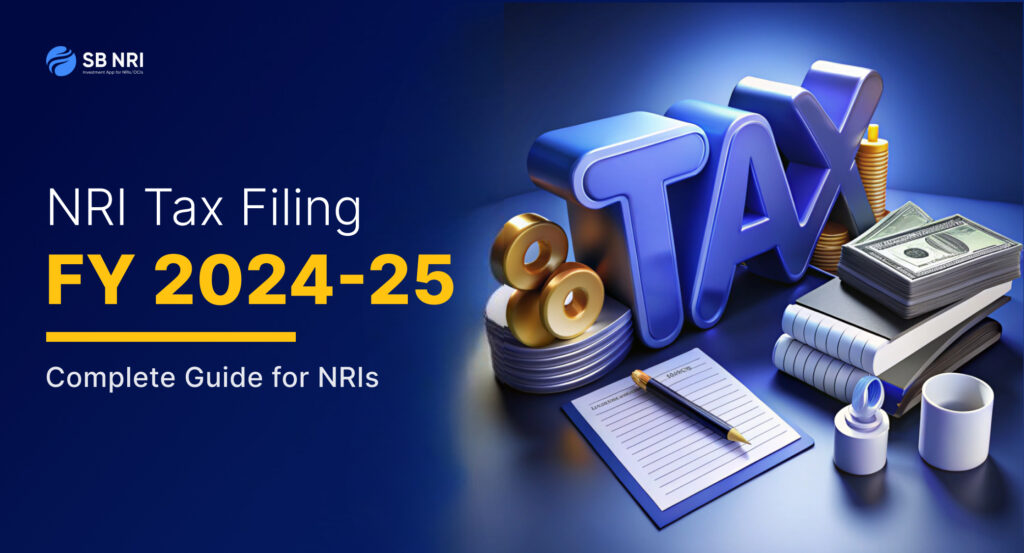
Introduction:
In India, filing ITR for NRIs might seem like a distant obligation – especially if your income is low, exempt, or earned abroad. But the reality is different. Even without significant earnings, filing your Indian Income Tax Return (ITR) can open the door to financial benefits, future planning, and peace of mind. And for FY 2024-25 (AY 2025-26), the rules have evolved.
This blog simplifies everything you need to know about NRI tax filing this year – who must file, why it’s advisable even when it’s not mandatory, common misconceptions, and how to make the process smoother with or without professional help.
Who Must File Tax Returns as an NRI?
Filing ITR for NRIs is mandated in India based on your income and certain financial activities. Here’s how the criteria break down:
Mandatory Filing:
You must file a tax return if:
- Your income chargeable to tax in India (at slab rates) exceeds ₹3 lakhs.
- You have income taxable at special rates, such as:
- Long-term capital gains (LTCG)
- Short-term capital gains (STCG)
- Dividend income
(Note: Even LTCG below ₹1.25 lakh—often tax-exempt—may require return filing.)
- You’re claiming exemptions or deductions under Sections 54, 54F, 54EC, etc.
(The exemption is allowed only if you file.)
Recommended Filing (Even if Not Mandatory):
You should file a return if during the financial year you:
- Deposit ₹1 crore or more into a current account.
- Deposit ₹50 lakhs or more into a savings account.
- Spend ₹2 lakhs or more on foreign travel.
- Spend ₹1 lakh or more on electricity bills.
- Have a business turnover above ₹60 lakhs or professional receipts over ₹10 lakhs.
- Have TDS (Tax Deducted at Source) or TCS (Tax Collected at Source) on your income.
Should You File If You Have a Loss?
Yes. Filing returns in a loss year is highly recommended.
- Why? You can carry forward the loss for up to 8 years and offset it against future profits in the same category – saving future tax.
What If You Only Have TDS Deducted?
Even if your only interaction with Indian income is TDS – ₹15,000 or ₹25,000 – filing ITR helps NRIs:
- Claim refunds for any excess TDS.
- Declare non-resident status, which can protect you if any future notices are triggered.
- Support loan applications, as many banks in India ask for past ITRs.
Capital Gains on Mutual Funds
There’s a popular misconception that NRIs don’t need to pay capital gains tax on mutual fund redemptions. Here’s the truth:
- This exemption is valid only for NRIs from countries with a favourable DTAA (Double Taxation Avoidance Agreement).
- Eligible countries: UAE, Oman, Kuwait, Saudi Arabia, Qatar, Singapore, Switzerland, and more.
- Not applicable if you’re a tax resident in the USA, UK, Canada, or Australia.
To claim this exemption:
- Get a Tax Residency Certificate (TRC) from your country of residence.
- File Form 10F with the Indian tax department.
- File your tax return in India and declare this income as exempt under DTAA.
- Claim a refund on any TDS already deducted.
Consequences of Not Filing (When You Should)
- No direct penalty if your income isn’t taxable—but the risks remain.
- Late filing fees may apply.
- For high-value transactions, non-filing can lead to:
- Notices from the IT Department
- Difficulty explaining your source of funds
- Assumptions of tax evasion, leading to penalties and tax demands
Bottom line: Filing a nil return is better than explaining non-filing later.
Step-by-Step Process for Filing NRI Tax Returns
If you’re filing on your own or via a CA, here’s what you’ll need to do:
- Register your PAN on the income tax e-filing portal: incometax.gov.in
- Download your Annual Information Statement (AIS) – contains income details from various sources.
- Download Form 26AS – shows tax deducted/collected.
- Match and verify the data.
- Calculate tax liability or refund.
- Choose the right form:
ITR-2 → Salaries, house property, capital gains, dividends.
ITR-3 → Business/professional income.
ITR-1/4 → Not available for NRIs. - Submit and e-verify.
Tip: Always double-check your AIS and Form 26AS to spot errors or unauthorized transactions.
Benefits of Filing Even When Not Required
- Declare residential status: Helps reduce scrutiny and simplify future correspondence.
- Easy access to loans: Indian banks often ask for ITRs from the last 2–3 years.
- Good financial hygiene: Regular filing builds a clean financial history.
Key Deadlines for FY 2024-25 (AY 2025-26)
- Original due date: July 31, 2025
- Extended deadline: September 15, 2025 (as per CBDT circular, May 27, 2025)
- Belated/Revised returns: Can be filed up to December 31, 2025 (with penalties and interest).
- For audit cases: October 31, 2025 / November 30, 2025 (if transfer pricing report is required).
Pro tip: Avoid filing before June 15, as Form 16, AIS, and SFT updates are usually completed only by mid-June, reducing errors and mismatches.
- Calculate and pay tax by March-end to avoid interest (1% per month).
- Approach a CA early to avoid the last-minute rush.
Final Thoughts:
In India, filing ITR for NRIs, is more than just a legal formality—it’s a safeguard. Whether you earn taxable income or not, filing returns ensures transparency, access to financial services, and protection against future legal or financial complications.
When in doubt, consult a qualified CA. Being proactive today can prevent penalties, protect your wealth, and streamline your financial life tomorrow.

If you need help filing your ITR as an NRI or understanding your eligibility under DTAA, reach out to a professional early this season.
Better safe than sorry.



